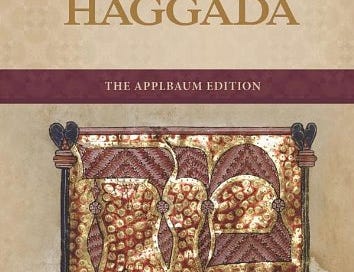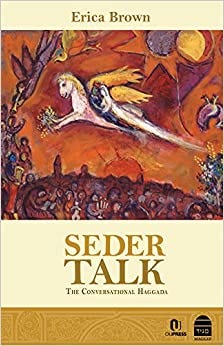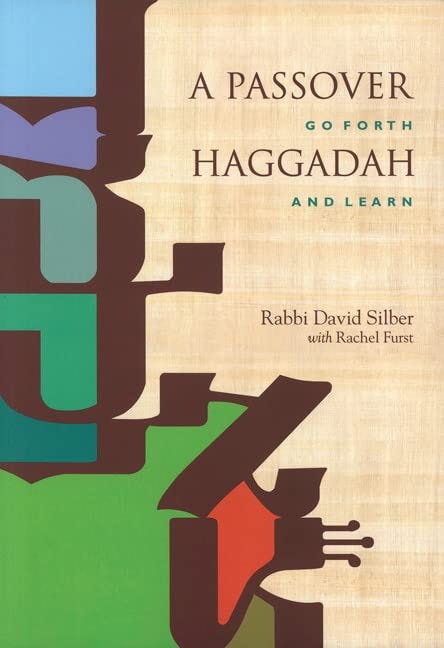Haggadah Recommendations, Volume I: Intellectual Haggadot
I recently received a text from a member asking for Haggadah recommendations. Specifically, after having used Rabbi Sacks’ for three years, they were looking for something “intellectual, with new commentary or essays.”
I sent them a quick list but thought it would be worthwhile to share in greater detail my recommendations.
But first, I need to stress why Rabbi Sacks’ Haggadah is the greatest thing since sliced bread – which, on Pesach, means it becomes the Greatest Thing.
I. The Jonathan Sacks Haggada
If it were just a commentary on the entire Haggadah it would be worth it. If it were just a short book with essays on the themes of Seder night it would be worth it. But this Haggadah is both.
If you open this Haggadah left to right, you encounter a 170-page book on Pesach, containing 21 original essays. If you like Rabbi Sacks’ Torah – if you’re even pareve on Rabbi Sacks’ Torah – these essays are Prime Rabbi Sacks: each and every single one of them has the power to astound you. I would recommend this Haggadah if you were to only read his novel and brilliant interpretation of the response to the Wicked Son; the essay is worth the purchase price alone – and the existential crisis that comes with it.
If you read the Haggadah right-to-left, the Haggadah is a typical Haggadah with Rabbi Sacks’ commentary. At this point, we’re familiar enough with his style from the Koren Sacks Siddur to know what to expect from his commentary here. It’s a series of bite-size ideas with more brilliance and wisdom than most Haggadot achieve in their entirety.
If you read the Haggadah upside down it’s just gibberish. Do not buy this Haggadah if you intend to read it upside down – it will do nothing for you.
I cannot overstate how much I believe that this is the best Haggadah out there.
II. Seder Talk, Erica Brown
In many ways, Seder Talk could simply be titled The Jonathan Sacks Erica Brown Haggadah. The publisher is the same and the format is identical: a 151-page book on Pesach read one way, and a commentary read the other way (and still gibberish upside down).
That Erica Brown has, in many ways, become Rabbi Sacks’ successor in recent years – she literally helms Yeshiva University’s Rabbi Lord Jonathan Sacks-Herenstein Center for Values and Leadership – doesn’t help shift this perception, but her Haggadah is saturated with her own unique worldview and intellect.
For starters, the essay side of her Haggadah contains nine essays, each labeled for one day of Pesach (plus an Epilogue), which gives this Haggadah unique staying power in it being something to read every day of Pesach – not just the first two nights. Within these essays, you’ll find a very different flavor of Torah thoughts from any other Haggadah.
It’s hard for me to pinpoint exactly what that flavor is but the best way I might categorize it would be to frame what I think an “intellectual” Haggadah is. It’s not simply the depth of thought within the pages but the source of those thoughts. If you’re looking for an intellectual Haggadah, you want to know that the author not only possesses a spiritual compass but is also familiar with Western ideas and values.
But most of the writers of intellectual Haggadot tend to be rabbis first and academically inclined second. Erica Brown is, to my mind, the opposite. She’s an academic who is also passionate about Torah. Her divrei Torah thus have an entirely different character – leading to perspectives and views that I would never consider and thus find inspiring.
If you like people who quote not just the length and breadth of Torah but also leadership books and poetry, then this Haggadah is for you. I like people who do this, so I like her Haggadah.
What’s also nice about her commentary is that she provides lots of prompts for you to ask at the Seder. I’ll be honest – this is not something that speaks to me. But if you want deep guiding questions to pose to others around your table then this Haggadah is worth it.
III. A Passover Haggadah: Go Forth and Learn, Rabbi David Silber with Rachel Furst
This Haggadah has a special place in my heart because it was the first Haggadah I ever bought when seeking something a little different to satisfy my recently discovered intellectual curiosity. I won’t lie – I bought it because it has a great front cover (which is a famously proven method of finding good books, as I believe the aphorism goes) and is published by JPS which, over ten years ago, I took as a stamp of intellectual approval.
Furthermore, I don’t even know who Rabbi David Silber is (obviously I can look up his bio online – but I know nothing about his Torah beyond his Haggadah).
And yet, I read parts of this Haggadah every year.
In a surprising twist, when considered against the other books on the list it has a collection of essays at the front (totaling 124 pages) and an admittedly meager commentary with the Haggadah itself.
The essays are fantastic close reads of the story of the Exodus, analyzing various themes that emerge. Rather than arguing for Big Ideas (like Rabbi Sacks and Dr. Brown) Rabbi Silber offers pure, peshat-oriented Torah. If you like my parashah shiurim, you’ll love this Haggadah – because the essays are perfect examples of what I try to achieve.
The commentary is a little dry and lackluster – but this is a relatively cheap Haggadah, so it can be forgiven for not being perfect. This Haggadah also contains my favorite idea ever (pp. 22–23) which, like a few of the ideas in the commentary, is presented as an mini-essay spanning a couple of pages. Based only on the Haggadah, my instinct is that Rabbi Silber excels at longform writing but not so much with quick, cute ideas.
IV. The Seder Night: An Exalted Evening/Festival of Freedom, Rabbi Joseph B. Soloveitchik
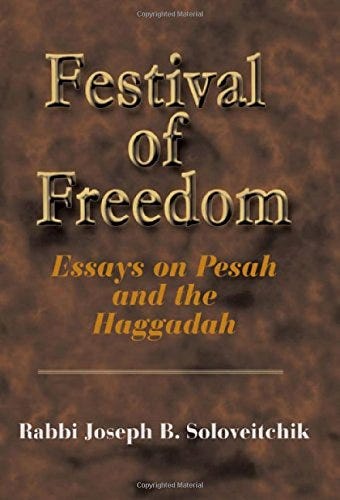
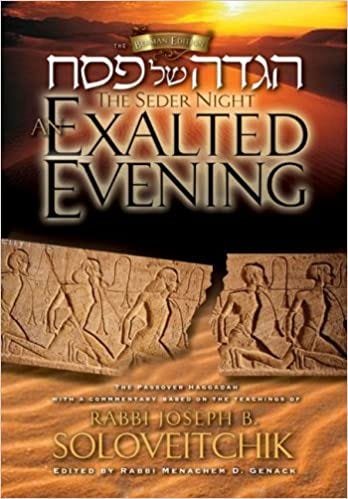
Unlike the other Haggadot on this list, Festival of Freedom is only essays, while An Exalted Evening is just a commentary.
Also unlike all the other Haggadot on this list, while reading it upside down will still resort in gibberish, many will find that reading it the right way will still resort in gibberish because Rav Soloveitchik’s works – as I often like to say – are only described as being written in English on a technicality: there’s no other language that comes as close to the language in which he is writing.
But, if statements such as “Judaism defies the philosophy of the redemptive potential of the aesthetic experience” sound interesting, then I have the books for you.
An Exalted Evening is a much easier read – in which Rabbi Genack culls from the Rav’s writings to develop a commentary. Festival of Freedom contains transcripts of many of the Rav’s shiurim.
But I would argue that there’s a value to reading the Rav even if you don’t understand him because it’s important to recognize his brilliance. Many rabbis who were otherwise renowned have little philosophical depths – but not so Rav Soloveitchik. What is clear on every page of either book is that his mind worked on a different level to everyone else. There’s a reason the Rav revolutionized the American Orthodox world and captivated people’s minds. These books expose the reader to some of that thought as it relates to Pesach – and thus contains both philosophical ideas, halakhic analyses, and incredible derashot.
Sure, it might take five hours to get through a few pages but there’s not much else to be doing on Yom Tov anyway. Bring Festival of Freedom with you to shul on Shabbat Chol ha-Moed – it’ll be better than following along to Shir ha-Shirim.

